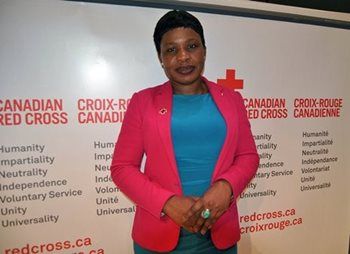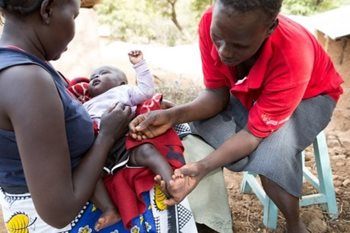On March 7, the Canadian Red Cross in partnership with Dalhousie University’s Global Health Office hosted a panel discussion in Halifax on the challenges and successes in strengthening the lives of women and children in conflict and fragile settings.
 Panelist Dr. Mariam Kone said working closely with the local community on the ground is a key to success in providing basic health care to women and children, especially in hard-to-reach areas. That includes training community-based health workers who can provide basic health services to women and children.
Panelist Dr. Mariam Kone said working closely with the local community on the ground is a key to success in providing basic health care to women and children, especially in hard-to-reach areas. That includes training community-based health workers who can provide basic health services to women and children.
“The suite of intervention of the Red Cross goes beyond healthcare to also include water and sanitation, nutrition, disease prevention and working to break down gender barriers,” explained Kone, who is Global Health Advisor for the Canadian Red Cross.
Kone describes remote areas where people struggle to meet their most basic needs as the “last mile,” adding that, “There are challenges logistically and that means a different way of working. We have to be flexible to reach the most vulnerable. Sometimes that means going by motorbike,” she says. “Training local volunteers offers a deep reach.”
Dr. Shelly Whitman, Executive Director of the Romeo Dallaire Child Soldiers Initiative, outlined how her organization works with former child soldiers and their families in ways that not only changes minds, but hearts, and takes the perception of advantage away from those who would use child soldiers.
 Whitman said another key to success is understanding the role uniformed police, military and other security forces play and how they are trained to respond to child soldiers.
Whitman said another key to success is understanding the role uniformed police, military and other security forces play and how they are trained to respond to child soldiers.
“Children usually first interact with a person in uniform. Preparing well-trained professional forces around the world to be prepared for interaction with child soldiers is crucial. Shock and awe is diminished if we prepare them beforehand.”
The Canadian Armed Forces were the first military force in the world to recently adopt a doctrine on how to practically approach and interact with child soldiers in armed conflict, she noted.
Dr. Helen Scott, Executive Director of the Canadian Partnership for Women and Children's, spoke in a hopeful tone about progress since Millennium Development Goals approved by the UN in 2000 to reduce maternal, child and newborn mortality.
"We know what the best practices are, but we need to reach those we haven't yet been able to reach," said Scott. “We need to make sure the work we do is led from countries we work with. Efforts have to be sustainable. It has proven to be fruitful so far.”
Though scheduled to speak in person at the Halifax forum, Scott instead joined virtually from Ottawa so she could attend on behalf of the Partnership (of which the Canadian Red Cross is a member), the Government of Canada’s announcement March 8 of $650 million over three years help Canadian, international and local organizations address gaps in sexual and reproductive health and rights in the world’s poorest and most vulnerable communities.